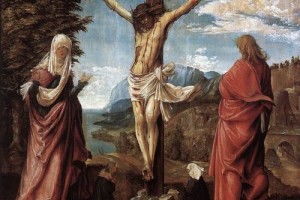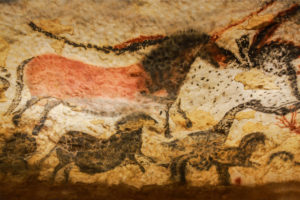They went to a place called Gethsemane; and Jesus said to his disciples, “Sit here while I pray.” He took with him Peter and James and John, and began to be distressed and agitated. And said to them, “I am deeply grieved, even to death; remain here, and keep awake.” And going a little farther, he threw himself on the ground and prayed that, if it were possible, the hour might pass from him. He said, “Abba, Father, for you all things are possible; remove this cup from me; yet, not what I want, but what you want.” (Mark 14:32-36)
Although he was a Son, he learned obedience through what he suffered; and being made perfect he became the source of eternal salvation to all who obey. (Heb. 5:8-9)
For as by one man’s disobedience many were made sinners, so by one man’s obedience many will be made righteous. (Rom. 5:19)
~
These are the three Scripture texts for the first station of the cross. Taken together, these three texts invite us to consider this prayer of Jesus’ as a significant part of the obedience by which we are being made righteous. Jesus’ decision to offer his grief and fear back to his Father is what saves us, and it invites us to turn from the ways in which we are accustomed to responding to our own fear and grief, finding fellowship with Jesus in prayer. So we will do well to reflect on this moment. St. Mark wrote that Jesus and the disciples went to a place called Gethsemane; and St. John adds that they crossed the brook called Kidron to get there.
Both place names are significant.
Gethsemane’s name comes from the Hebrew word, Gat-shemen, which means olive press. At an olive press, the fruit would be placed into a stone basin, in which it would be pressed by a large millstone, which would have been rolled over the olives with a wooden handle. Into one container, the crushed pulp of the body of the olives would be discarded, and into another would flow their oil for its various uses: fueling lamps and performing various anointments among them.
Kidron comes from the Hebrew verb, “Kidar” which means to be dark or to darken, to mourn or to cause to mourn; and the two senses of the word—darkness and mourning—have been taken together throughout Scripture. Hear Job who, like Jesus, sought companionship from three friends in prayer: “I go about darkened, but not by the sun; I stand up in the assembly and cry for help. I am a brother of jackals and a companion of ostriches. My skin turns black and falls from me, and my bones burn with heat. My lyre is turned to mourning, and my pipe to the voice of those who weep.” And Jeremiah’s use: “I looked, and behold, the fruitful land was a desert, and all its cities were laid in ruins…For this, the earth shall mourn, and the heavens above be dark.” (4.26, 28)
God furnished the first Garden before placing the first man and his wife to bear fruit in it. Again, in his providence, led the Hebrews to give this place a name that suits it as a place for his Son to bear fruit. Jesus enters Gethsemane, where he would be crushed like an olive “for our iniquities,” by way of the stream of sadness and mourning, to offer his very particular and very human grief and fear back to his, and our, Father.
During his prayer, Jesus asks whether it were possible that this hour, and this cup, might pass from him. In this, Jesus is not asking his father’s permission to not be our savior. He protects against this interpretation in John 12.27: “Now my soul is troubled, and what shall I say? ‘Father, save me from this hour?’ But for this purpose I have come to this hour.” Instead, he makes good on his natural and eternal dignity as his Father’s only Son, articulating his human grief, fear, and desire before him among his friends: “I am deeply grieved, even unto death; remove this cup from me.” I do not think we would be wrong to infer that this moment of prayer, having the innermost thoughts of his heart intimately heard by his Father, gave Jesus the courage to walk the rest of the way to his cross. After all, in St. Luke’s account, an angel is sent from heaven in this moment to strengthen him (22.43)
During Holy Week, and especially during the stations of the cross service, we have an opportunity, and we are encouraged, to make devotional use of these texts. We could certain invent our own reflections on the pairing of The River of Darkness and Mourning with the Garden of the Olive Press, but I think Scripture has already given us a place to begin our reflections.
Singing “The Song of Songs” in Gethsemane
I am tempted to read this moment for its reflections on friendship with Christ. This is the moment where Christ himself says that “No greater love has man than this, that he lay down his life for his friends,” (Jn. 15.13) borrowing the phrase directly from Peter: “I will lay down my life for you.” (13.37) Peter does not lay down his life for his friend.
Instead, I want to think about singing The Song of Songs in Gethsemane. The first few lines anticipate the setting of this reading by combining the two motifs of Kidar-darkness and freshly-pressed oil. Christ, of course, is the husband, and the Church is his bride. So hold this image of Christ in your mind: the groom who has crossed The River of Darkness and Mourning and thrown himself to the floor in grief in the Garden of the Olive Press is preparing himself for his Bride. Now read her opening lines in the song:
Let him kiss me with the kisses of his mouth!
For your love is better than wine;
your anointing oils are fragrant;
Your name is oil poured out;
therefore virgins love you.
Draw me after you; let us run.
The king has brought me into his chambers.
I am very dark, but lovely,
O daughters of Jerusalem,
like the tents of Kidar,
like the curtains of Solomon.
Let this one kiss me with the kisses of his mouth. His love is better than wine, and we would do well to remember that when we drink from the cup. He is, in fact, poured out for us, crushed like an olive, and this is what his name stands for. Virgins, those who have said the “No” of Lent, love this man. As the virgins have taken 40 days of fasting, their griefs and fears will have become more salient, and their admiration for Jesus will only increase.
The word of prayer is “Draw me after you.” Take us along the lifelong path of the cross which we call discipleship, and of which this station is just the first. In fact, let us throw off both sin and those things which entangle us, for we have already been brought into the presence of God by Jesus’ sacrifice.





Leave a Reply
Your email is safe with us.